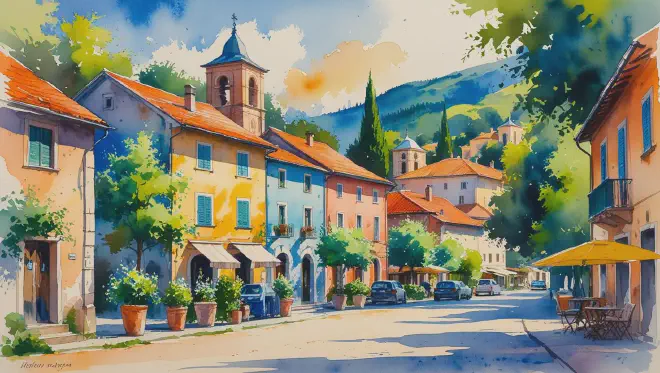Introduction
Despotovac—when I first heard the beautiful sound of this town’s name, something stirred quietly in the depths of my heart. Located in the inland region of central-western Balkans in Serbia, it may not be a particularly large town, but it holds deep history dating back to medieval times. This place, bearing the name of Despot (autocratic ruler), was one of the important strongholds of the Serbian Despotate that flourished in the 14th century.
The charm of this town lies in its layered history. From ancient Roman ruins to medieval monasteries, and from there to early modern folk culture, traces of civilizations across time breathe quietly here. In southern Serbia, there are monastery complexes with beautiful fresco paintings created in the 13th-14th centuries, and such spiritual heritage is scattered around the Despotovac area as well.
The hilly terrain surrounding the town is painted with wildflowers in spring and turns golden in autumn. Here exists a slowly flowing time, completely removed from urban hustle and bustle. The people are warm, welcoming visitors like family members. Those three days and two nights in Despotovac felt less like a journey and more like discovering another hometown.

Day 1: Opening the Door of Time
About 120 kilometers southeast from Belgrade, swaying in a bus for two and a half hours. While gazing at the Serbian countryside spreading outside the window, my heart was already filled with anticipation for the journey about to begin. Around 2 PM, I arrived at Despotovac’s small bus terminal.
The air was different—that was my first impression. It lacked the heaviness characteristic of cities, and the wind carried the scent of grass and the fragrance of earth. Miloš, the guesthouse owner who came to pick me up, was a gentle man in his sixties who spoke to me in broken English mixed with Serbian. The warmth of his “Dobrodošli (welcome)” was a fitting greeting for the beginning of my journey.
The guesthouse was located in a quiet residential area, slightly removed from the town center. It was a traditional Serbian-style house with white walls and a red tile roof, with seasonal flowers blooming in the small garden. The room was simple but clean, and through the window, I could see distant hills stretching into the horizon.
After placing my luggage, I decided to explore the town center first. Walking along the cobblestone streets, I could feel the depth of this town’s history. During the 14th century Serbian Despotate period, this land played important political and cultural roles. Even today, stone buildings and parts of fortress walls from that era remain scattered throughout the town, telling stories of those times.
The small market held in the town’s central square left a strong impression. Local farmers displayed vegetables and fruits they had grown, handmade cheese and bread, and traditional handicrafts. Even without a common language, the smiles of the vendors were universal. I bought an apple and bit into it—it had an authentic taste of the land that you could never experience in urban supermarkets.
In the evening, the dinner prepared by Ana, Miloš’s wife, was the essence of Serbian home cooking. Ćevapi (small sausage-shaped meat dishes) and ajvar (paprika paste), along with homemade bread and yogurt. Though simple, the dishes maximized the flavors of the ingredients, satisfying both heart and stomach.
After the meal, Miloš served me rakija, a traditional Serbian fruit brandy. Made from plums, despite its strong alcohol content, the sweetness and aroma of fruit spread through my mouth. While gazing at the fireplace flames, I listened to his stories about the town’s history and his family. Though there was a language barrier, there are no borders when it comes to heart-to-heart communication.
At night, looking out from my room window, a star-filled sky spread before me. For eyes accustomed to city lights, such abundance of stars felt fresh and beautiful. My first night in Despotovac passed while counting constellations, my chest swelling with anticipation for tomorrow.
Day 2: A Day Embraced by Monastery and Nature
I woke to the sound of birds singing in the garden. Looking at the clock, it was 6:30 AM. It was impossibly early for city life, yet my body had awakened naturally. The breakfast Ana prepared consisted of homemade bread and jam, fresh eggs, and rich coffee. She also served herbal tea made from herbs picked in the garden.
Today’s destination was an ancient monastery about 15 kilometers from town, nestled in the mountains. Miloš offered to drive me there. As we climbed the winding mountain road, he taught me about the region’s history. In the 14th century, before the Ottoman Empire’s invasion began, many monasteries were built in this area, serving as important centers of Serbian Orthodoxy.
Upon arriving at the monastery, I was overwhelmed by its tranquility. This monastery, inheriting the tradition of beautiful fresco paintings from the 13th-14th centuries, achieved perfect harmony between its beautiful stone architecture and surrounding nature. One of the monks guided me through the interior, which was a solemn space of prayer.
Particularly impressive were the frescoes inside the sanctuary. The figures of saints, still vivid after centuries, seemed to speak even now. The monk quietly told me how these paintings had survived through times of war and turmoil. The power of faith and the beauty of art had supported people’s hearts across generations.
In the monastery garden, the monk showed me the herb garden he tended. Lavender, rosemary, thyme, and other plants used for cooking and medicine were carefully maintained. They lived a self-sufficient life while passing traditional knowledge to the modern era. As I listened to explanations about each plant, I was prompted to reconsider the meaning of living in harmony with nature.
In the afternoon, I strolled through a nearby nature park. This region, blessed with abundant nature, beautifully harmonized forests and grasslands. Walking along forest paths, wildflowers, bird songs, and the murmur of clear streams healed my heart. I savored the luxury of surrendering to nature’s rhythm, something easily forgotten in urban life.
From the observation deck in the park, I could overlook the town of Despotovac and the surrounding pastoral landscape. In the afternoon sunlight, the scenery woven by red-roofed houses and green hills looked like a painting. In this beautiful landscape, I contemplated the lives of people who had lived here for generations.
On the way back to town in the evening, we stopped at a local winery. This region had long been known for winemaking, particularly famous for red wine. In the cellar the owner showed me, I tasted wines made using traditional methods. The unique flavor born from the local climate and terroir was truly the personality of Despotovac itself.
The evening meal consisted of sarma (cabbage roll dish) prepared by Ana, accompanied by wine purchased from the winery. This traditional dish of rice and meat wrapped in cabbage, slowly simmered in tomato sauce, had complex and deep flavors that spoke of the rich culinary culture of this land.
Before going to sleep, I once again gazed at the starry sky while reflecting on the day’s events. The silence at the monastery, the sense of liberation in nature, and the heartwarming interactions with people—I felt that Despotovac was a place that offered many gifts to travelers.
Day 3: Farewell and Promises of Return
On my last morning, I woke particularly slowly and peacefully. I had to return to Belgrade that afternoon. As the time of departure approached, my attachment to this small town grew deeper.
After breakfast, I decided to take one final walk through the town. I chose a different route from yesterday to explore alleys and buildings I hadn’t yet seen. Ancient stone churches, traditional wooden houses, and scenes of people’s daily lives—everything left deep impressions, engraving themselves in my heart.
I visited the town museum to learn more about Despotovac’s history in detail. From ancient Roman artifacts to early modern folk materials, traces of various cultures that had passed through this land were displayed. Medieval weapons and ornaments particularly testified to how this place had once been an important political center.
The female curator at the museum explained the exhibits in fluent English. Through her stories, I came to understand well how Despotovac had been a crossroads of diverse cultures. Here was a history where Eastern and Western civilizations, Christianity and Islam, various ethnic groups had met, sometimes clashed, and sometimes merged.
For lunch, I savored traditional Serbian cuisine at the town’s oldest restaurant. Pljeskavica (hamburger-like meat dish) and kajmak (cream-like cheese), along with a salad made from local vegetables. It was a culmination of the land’s flavors, fitting for my final meal.
After the meal, Miloš and Ana came to see me off. Though my stay had been brief, these two who had welcomed me with family-like warmth received my heartfelt gratitude in our farewell. Ana gave me homemade jam as a souvenir, and Miloš said, “You must come back again.”
I still vividly remember Miloš continuing to wave until he disappeared from the bus window. The landscape from the car window as I left Despotovac looked completely different from when I had arrived. It no longer seemed like an unknown land, but felt like a second hometown, connected by precious memories and bonds with people.
On the road back to Belgrade, while reflecting on these three days and two nights, I thought about the true meaning of travel. Travel isn’t just about touring tourist spots. Perhaps the real essence of travel lies in settling in one place, breathing its air, interacting with its people, and feeling its culture with your skin.
Conclusion
Those three days and two nights in Despotovac, though an imaginary journey, carry the reality of having truly existed there. The silence I experienced in this small Serbian town in the inland central-western Balkans, the encounters with warm people, and the moments of feeling the weight of history continue to live vividly in my heart even now.
Perhaps travel isn’t about visiting new places, but about discovering new aspects of yourself. On the stage of Despotovac, I was able to remember the fundamental human activities often forgotten in urban life and position myself within the continuity of history.
The frescoes I saw at the monastery, the wind I felt in the nature park, the smiles of Miloš and Ana, and the star-filled sky—all of these, though fictional experiences, are etched in memory as if I had actually felt them with my five senses. This represents the power of imagination and simultaneously expresses humanity’s longing for universal experiences that the heart seeks.
Someday, I might truly visit Despotovac. When that time comes, will I be able to reunite with the landscapes and people I met in this imaginary journey? Reality might exceed this imagination, or perhaps imagination might prove more beautiful. But that would be fine. The true value of travel lies in what influence it has on the life that follows.
Despotovac—that beautiful sound still holds special meaning in my heart. This journey, though imaginary yet feeling as if it truly happened, possesses richness and depth that rivals any real journey. That might be the wonder of human imagination and the true power that longing for travel holds.

